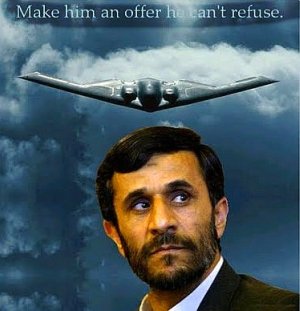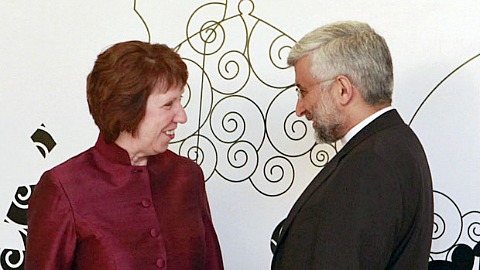Archives
AND MORE...

Sanctions: The Farce
_____________________

Yes, You Can!
_____________________

Fric & Frac
_____________________

So Much For Sanctions...
_____________________
May 24, 2012
An Offer They Can't Refuse
Once again, Iran is successful in spinning the rest of the world around its little finger. As predicted, “negotiations” between Iran and the P5 +1 (i.e., the five permanent UN Security Council members plus Germany) are benefitting but one side and that side is Iran.
The latest tête-à-tête between the sides ended Thursday with….yup, you guessed it, another agreement to meet again next month for another round of talks (see below). Keep in mind that this latest round of talks, which ended on Thursday, was also the result of a round that ended with zip, zero, zilch except an agreement to meet again in 6 weeks.
Time is on Iran's side. And in offering them incentives to halt “the most sensitive part” of their nuclear production, the almighty U.S. of A and its international appendages have achieved the exact opposite, as nothing emboldens the Iranians more than signs of weakness from the other side.
"Giving up 20 per cent enrichment levels in return for plane spare parts is a joke," said Iranian analyst Hassan Abedini. “The package is unbalanced and therefore unacceptable." He’s right, the package is indeed unbalanced, which is why we highly recommend America do the following:

CBC News | May 24, 2012
Nuclear Talks With Iran End With Little Progress
Next round of negotiations scheduled for next month in Moscow
By The Associated Press

Iran's top negotiator Saeed Jalili, right, conveyed his concerns in a private meeting with EU Foreign Policy Chief Catherine Ashton. Iran wants the West to ease back on sanctions which have targeted the country's oil industry. (Hadi Mizban/Associated Press)
Tough negotiations between Iran and world powers over Tehran's nuclear program ended Thursday with a plan to meet next month for another round of talks but agreement on little else.
The open channels between Iran and the six-nation bloc — the five permanent UN Security Council members plus Germany — are seen as the most hopeful chances of outreach between Washington and Tehran in years. They also could push back threats of military action that have shaken oil markets and brought worries of triggering a wider Middle East conflict.
European Union foreign policy chief Catherine Ashton said both sides agreed to continue the discussions on June 18-19 in Moscow in hopes of a breakthrough on international concerns about the Islamic Republic's ability to build atomic weapons.
The announcement capped two days of negotiations in Baghdad, where at times it appeared Tehran would withdraw from the talks in frustration over the West's refusal so far to scale back tough economic sanctions.
"It is clear that we both want to make progress, and that there is some common ground," Ashton, who is formally leading the talks, told reporters at the end of the talks. "However, significant differences remain. Nonetheless, we do agree on the need for further discussion to expand that common ground."
Israeli leaders have been critical of the talks, claiming it allows Iran to buy time and drive a wedge between Washington and Jerusalem. On Wednesday, Israel's Defence Minister Ehud Barak said even possible moves by Iran to open its nuclear facilities to greater UN inspection doesn't rule out a possible Israeli military strike.
Iran went into the Baghdad talks seeking guarantees the West will scale back on its sanctions, which have targeted Iran's critical oil exports and have effectively blackballed the country from international banking networks.
Instead, Tehran's negotiators on Thursday rejected proposals by the world powers to curb its nuclear program without getting much in return, calling them unbalanced. Saeed Jalili, Iran's top nuclear negotiator, demanded an overhaul to the Western plan and conveyed his concerns in a private meeting with Ashton on Thursday.
West offers incentives to limit enrichment
At the heart of the issue are two different proposals. On one side is an incentive package by the six-nation group — the United States, Russia, China, Britain, France and Germany — that seeks to halt the most sensitive part of Iran's nuclear fuel production.
Iran, in turn, wants the U.S. and Europe to ease harsh economic sanctions on its oil exports in return for pledges to give wider access to UN inspectors and other concessions.
The West and its allies fear Iran's nuclear program could eventually produce atomic weapons. Iran insists its reactors are only for energy and research.
A senior U.S. official predicted the pace of the talks — which began last month in Istanbul — would speed up in upcoming rounds.
"We are urgent about it, because every day we don't figure this out is a day they keep going forward with a nuclear program," said the U.S. official who spoke on condition of anonymity to discuss the negotiations more candidly. "We still think we have some time for diplomacy, but it's not indefinite."
Iranian analyst Hassan Abedini called the proposal put forward by the U.S. and its allies unbalanced and filled only with old plans that Tehran dismissed years ago.
The Western package calls on Tehran to halt the production of 20 per cent enriched uranium, which is the highest grade publicly announced by Iran and used for the country's lone medical research reactor. Western leaders fear the material — far above the 3.5 per cent enrichment needed for energy-producing reactors — can be turned into warhead grade in a matter of months.
In exchange, the world powers offered benefits, including medical isotopes, some nuclear safety co-operation and spare parts for civilian airliners that are needed in Iran.
But they snubbed Iranian calls for an immediate easing of significant economic sanctions imposed on Tehran for flouting UN Security Council resolutions that demand the suspension of all enrichment.
"Giving up 20 per cent enrichment levels in return for plane spare parts is a joke," said Abedini. "The package is unbalanced and therefore unacceptable."
Original article here.
Log In »
Perhaps it is too far in the past for some to remember Neville Chamberlain demonstrating to the Nazi’s that appeasement will get you everywhere or quickly plunged into total war with over 350,000 of your fellow countrymen dead. One can understandably accept such conciliation from European nations but not from this country, not the U.S. Therefore you can only hope that behind the scenes there are competent men and women explaining as best they can to Iranian leaders that the most notable ardent anti-democratic, anti-Semitic leader of a nation unceremoniously committed suicide and was burned in some courtyard of his pulverized nation. Or was found in a hole and later hanged. Or was found in a drainage pipe and shot to death on the hood of a beat-out pick-up truck. Let’s hope the Iranians know there history, but it doesn’t seem that way.
Notable Quotables
"Mr. Netanyahu is one of the most media-savvy politicians on the planet. On Friday he appeared live via video link on 'Real Time with Bill Maher,' taking the host’s alternately sardonic and serious line of questioning with gazelle-like alacrity."
~ Anthony Grant, jourrnalist who has written for many major newspapers and worked in television at Paris and Tel Aviv, interviewing former PM Benjamin Netanyahu on Monday, at the outset of Mr. Netanyahu's new book (more here).


